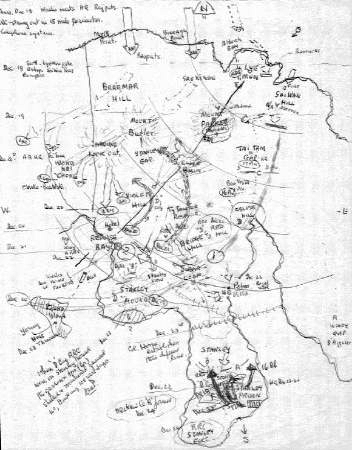| |
Map From Major
Parker's War Diary

Map showing
the attack and advances of the
Japanese on December 18 to
December 25, 1941
The
Attack Continues ...
The Japanese next ran into "C" Company of the Royal Rifles under
the command of Major Bishop. He saw the Japanese take Fort Sau
Ki Wau directly in front of his position and his men were under
fire from the fort even as he radioed Wallis's Headquarters to
inform them of the situation. He was shocked by the response.
Major Parker wrote of that conversation; "For the second time,
in a period of only a few days, Major Bishop, officer commanding
"C" Company and Brigadier Wallis were to have "words" with each
other. Bishop claimed that the enemy had taken Fort Sau Ki Wan.
Wallis said, 'There are Canadians in the fort and I have
definite information that there are friendly troops there.'
Bishop replied, 'They don't act friendly. We are being raked by
automatic fire from there at this moment and I am going to
attack at once.' "
The Japanese advance had been so rapid that Brigadier Wallis did
not believe that an attack had even taken place. Wallis did not
trust the Canadians, and Canadian confidence in the brigadier
was waning.
Major Parker Wrote:
"Ordinarily this is not worth mentioning but this distrust, on
the part of Wallis, was to set the scene for relations between
East Brigade Headquarters and the Royal Rifles for the rest of
the battle for Hong Kong. Wallis would not believe that the
attack was coming from the mainland. He seemed confused, and his
orders became erratic."
As the Japanese began to fan out and
push towards the West, and the South before pushing up through
the defiles towards the high ground, "C" Company of the Royal
Rifles launched a counter-attack against the 229th. Regiment
pushing them off the hill and making it to the very walls of
Fort Sai Wan. The Japanese suffered severe losses, and "C"
Company, RRC, had suffered many casualties as well. They were
exhausted and running low on ammunition and were forced to
withdraw. It was during this furious action that Major Bishop
earned a DSO for his courageous, and persistent actions. He
himself had led the attack and had killed seven Japanese with
his Tommy Gun.
"D" Company, RRC, had been ordered to relieve "C" Company and
were on their way to take over the counter-attack, but the
mission was cancelled. In the flurry of conflicting orders that
followed, the counter-attack fell apart. The Japanese were able
to capture the Fort and the dominant high ground on Mount
Parker.
"C" Company fell back towards the outer perimeters of "D"
Company's , RR of C, position where they joined up with "D"
Company's Number 17 Platoon under the command of Lieut. Frank
Power. Lieut. Power had been on his way to give assistance to
"C" Company and was pushing back up Mount Parker giving the
Japanese a stiff fight. Number 16 Platoon of "D" Coy was sent to
join up with Number 17 Platoon and assist in the attack, but
orders were cancelled before the attack could be completed. Both
platoons were recalled to Obelisk Hill. "C" Company was
withdrawn from Mount Parker and ordered to the rear for much
needed food and rest. They were regrouped, resupplied with
ammunition, then moved to a new location at Palm Villa, north
east of Stanley Village. In that position they would, again, be
the first to face a Japanese attack.
"C" and "D" Companies of the Royal Rifles of Canada had blocked
the Japanese thrust southward from Fort Sau Ki at Tai Tam, but
the enemy had gained the northern high ground in an arc from
Mount Parker, to Mount Butler and Jardine's Lookout. The
Japanese held all the high ground on the North end of the
island. "D" Company of the Royal Rifles of Canada had lost their
first man. Rifleman G. Irvine, of number 17 Platoon, had been
killed at about 21:00 hours near Fort Sau Wan.
________________________________________
|
